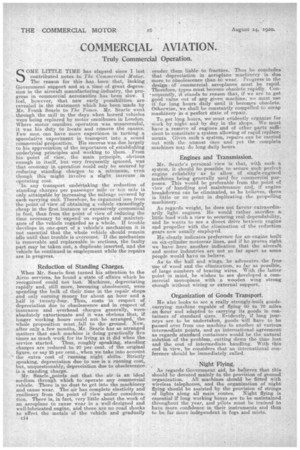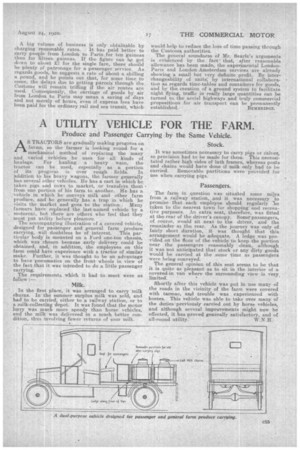COMMERCIAL AVIATION.
Page 16

Page 17

If you've noticed an error in this article please click here to report it so we can fix it.
Truly Commercial Operation.
SOME LITTLE TIME has elapsed since I last contributed notes to The Commercial Motor. The reason for this has been that, lacking Government support and at a time of great depression in the aircraft manufacturing industry, the progress in commercial aeronautics has been slow. I feel, however, that new early possibilities are revealed in the statement which has been made by Mr. Frank Searle to The Times, Mr. Searle went through the mill in the days when horsed vehicles were being replaced by motor .omnibuses in London. Where motor omnibus operation was unsuccessful, it was his duty to locate and remove the causes. Few men can have more experience in turning a speculative experiment in transport into a sound commercial proposition. Hie success was due largely to his appreciation of the importance of establishing underlying principles and working to them. From his point of view, the main principle, obvious enough in itself, but very frequently ignored, was that economy in operhtion could only be secured by reducing standing charges to a, minimum, even though this might involve a slight increase in operating cost. -In any transport undertaking the reduction of standing charges per passenger mile or ton mile is only attainable by increasing the mileage covered by each carrying unit. Therefore, he organized less from the point of view of obtaining a vehicle exceedingly cheap in the first instance or excessively economical in fuel, than from the point of view of reducing the time necessary to expend on repairs and maintenance of the vehicle regarded as a whole. If trouble develops in one,spart of a vehicle's mechanism it is not essential that the whole vehicle should remain idle until that trouble is overcome. If the mechanism is removable and replaceable in sections, the faulty part may be taken out, a duplicate inserted, and the vehicle be continued in employment while the repairs are in progress.
Reduction of Standing Charges.
When Mr. Searle first turned his attention to the Airco services, he found a state of affairs which he recognized could not last. Machines, depreciating rapidly and, still more, becoming obsolescent, were spending the bulk of their time in the repair shops and only earning money for about an hour and a, half in twenty-four. Thus, costs in respect of depreciation due to obsolescence and in respect of insurance and overhead charges generally, were absolutely extortionate and it was obvious ethat, if longer working hours could not be arranged,' the whole proposition must, fall to the ground. Now, after only a few months, Mr. Searle has so arranged matters that each machine is doing practically five times as much work for its living as it did when the service started. Thus, roughly speaking, standing charges are reduced to 20 per cent, of the original figure, or say 25 per cent., when we take into account the extra cost of running night shifts. Strictly speaking, depreciation due to use is a running cost, but, unquestionably, depreciation due to obsolescence is a standing charge.
Mr. Searle tpoints out that the air is an ideal medium through which to operate any commercial vehicle. There is no dust to get into the machinery and cause wear. The air has complete elasticity and resiliency from the point of view under consideration. There is, in fact, very little about the work of an aeroplane to cause wear in a well-designed and well-lubricated engine, and there are no road shocks to affect the metals of the vehicle and gradually 014 render them liable to fracture. Thus he concludes that depreciation in aeroplane machinery is due more, to obsolescence than .to wear. . Progressin the design of commercial aeroplanes must be rapid.Therefore, types must become obsolete rapidly. Consequentlee it 'stands to reason that, if we are to get good value out of any given machine, we must use it for long hours daily until it becomes obsolete. Otherwise, we shall be constantly 'compelled to scrap maehinery in a perfect state of repair.
To get long hours, we must evidently organize for work by night and by day in the shops. We must have a reserve of engines and of other parts sufficient to constitute a system allowing of rapid replacements. Given such a system, repairs can be carried out with the utmost care and yet tire complete machines may do long daily hours.
Engines and Transmission.
Mr. Searle's personal view is that, with such a, system, it should be possible to secure such perfect engine reliability as to allow of single-engined machines being generally used for commercial purposes. This would be preferable from the point of view of handling and maintenance and, if engine breakdowns can be eliminated; as he believes, there is little or no point in duplicating the propelling. machinery.
As regards weight, he does not favour extraordinarily light engines. He would rather sacrifice a little load with a view to securing real dependability, and he wants to see a, direct drive between engine and propeller with the elimination of the reduction gears now usually employed.
He clearly indicates preference for am-engine built on six-cylinder motorcar lines, and if he proves right we have here another indication that the aircraft and motor industries are not so far apart as some people would have us. believe.
-As to the hull and wings; he advocates the free 'use of wood and the elimination, so far as possible, of largo numbers of bracing wires. With the latter point in mind, he wishes to see developed a commercial monoplane with a wooden wing strong' enough without wiring or external support.
Organization of Goods Transport.
He also looks to 'see a really strongly-built goodscarrying machine capable of flying GO to 70 miles. • an hour and adapted to carrying its goods in containers of standard sizes. Evidently, if long journeys are to be undertaken, goods will have to be passed over from one machine to another at various intermediate points, and an international agreement as regards standard containers would be the natural solution of the problem, cutting down the time lost and the cost of intermediate handling. With this end in view, he considers that 'an international conference should be immediately called.
' Night Flying.
As regardsGovernment aid, he believes that this should be devoted mainly to the provision of ground.organization. All machines should be fitted with wireless telephones, and the organization of night flying should be assisted by the provision of strings of lights along all main 'routes. Night flying is essential if long working hours are to be maintained throughout the year, and pilots must be trained ta have more confidence in their instruments and thus to be far more independent in fogs and mists. •
A big volume of business is only obtainable by
charging reasonable rates. It has paid better to carry people from London to Paris for ten guineas than for fifteen guineas. If the figure can be got down to about 1,7 for the single fare, there should be -plenty ef patronage for a passenger service. As regards goods, he suggests a rate of about a shilling a pound, and he points out that, for some time to come, the delays due to getting parcels through the Customs will remain trifling if the air routes are used. Consequently, the carriage of goods by air from London to Paris may mean a saving of days and not merely of hours, even if express fees have been paid for the ordinary rail and sea transit, which
would help to reduce the lossof time passing through the Customs authorities.
The general soundness of Mr. Searle's arguments is evidenced by the fact that, after reasonable allowance has been made, the experimental LondonParis and London-Amsterdam 'services are already showing a small but very definite profit. By interchangeability of units; by international collaboration as regards time-tables and containers for goods, and by the creation of a ground system to facilitate night flying, traffic in really large quantities can be turned to the aerial highways and truly commercial propositions for air transport can be permanently
established. BEMBRIDGE.




























